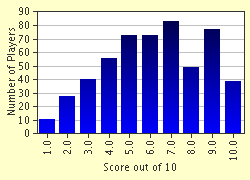Quiz Answer Key and Fun Facts
1. First he subjected us to his adolescent pranks and then ran away from the fight. In short, what have we here?
2. Our diminutive companion's wisdom belies his stature. He is always uttering pithy profundities. In two words (after an article), how should we describe our little friend?
3. The poor, tenderhearted young lady is struggling to control her emotions. She is weeping disconsolately over the injured sparrow. In brief, how could one describe this sentimental youngster?
4. It appears that I will have to intervene. I see the neighbor's orange cat creeping through the foliage towards my bird feeder. In short, what sort of kitty are we dealing with?
5. We're all a bit tense around the abbey. Our spiritual leader has been in a truly foul temper, flying off the handle at the slightest provocation. Succinctly expressed, with what are we afflicted?
6. As the impassioned harangue continued, we became increasingly restless. Clearly, the speaker was determined to repeat every point in favor of his position several times before yielding the floor. To be brief, for what were we the unwilling audience?
7. Shivering in the chill of the cramped burial place, we searched for our father's grave, but the dim light rendered the inscriptions difficult to read. In short, in what sort of place were we laboring?
8. The young man was stylishly dressed and dapper; an eye patch was the only evidence of the rough sort of life the young hoodlum lived. How might one succinctly describe him?
9. Gazing at the statue I became vaguely uneasy. As I concentrated on the disturbing features of the image, I felt the hairs at the nape of my neck stand on end, and I began to tremble uncontrollably. To be concise, what sort of sculpture was I viewing?
10. Although the candidate rambled on languidly, we heard nothing that was either sensible or significant. In two words, how could this sort of vapid presentation be characterized?
Source: Author
uglybird
This quiz was reviewed by FunTrivia editor
agony before going online.
Any errors found in FunTrivia content are routinely corrected through our feedback system.

